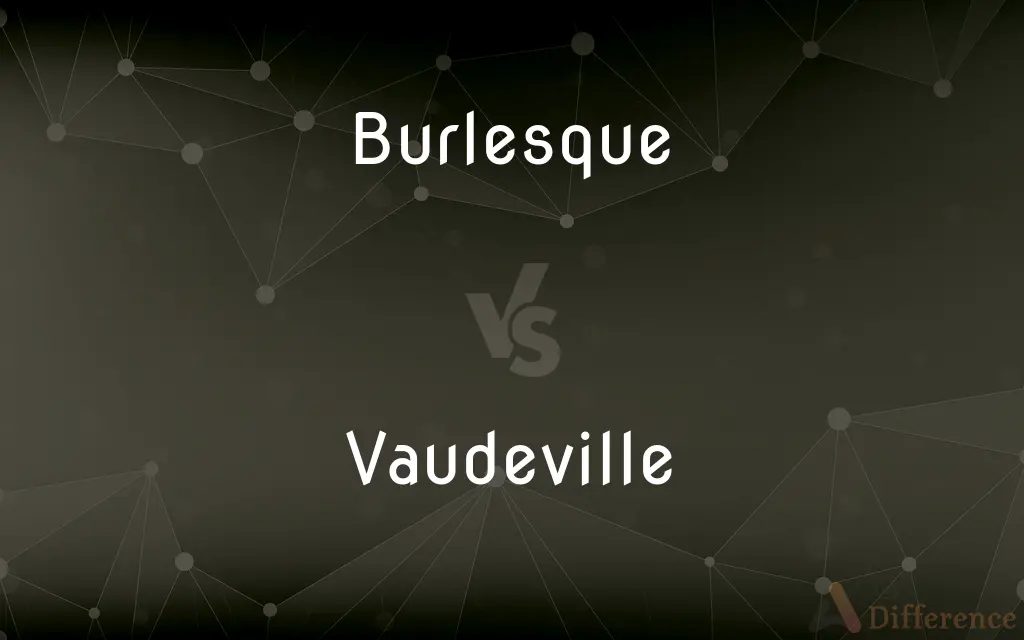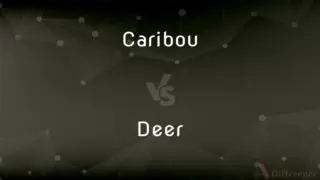Burlesque vs. Vaudeville — What's the Difference?
By Fiza Rafique & Urooj Arif — Updated on March 7, 2024
Burlesque is a theatrical genre known for its parody and exaggeration, often with a focus on comedy and striptease, while Vaudeville was a variety entertainment form featuring a series of separate, unrelated acts.

Difference Between Burlesque and Vaudeville
Table of Contents
ADVERTISEMENT
Key Differences
Burlesque, originating in the 17th century, has evolved to include a wide range of performance styles, focusing primarily on parody, comedy, and sometimes young's entertainment, notably striptease. Vaudeville, emerging in the late 19th century, was a family-friendly variety show that included comedians, musicians, magicians, and acrobats, without a fixed theme or narrative.
While burlesque often emphasizes the satirical or humorous aspect of its subjects, making use of musical and dance elements to do so, vaudeville provided a platform for a diverse array of live performances, relying less on satire and more on the variety and talent of its performers.
Burlesque shows were known for their tendency to challenge social norms and explore taboo subjects, often incorporating a mix of sophistication and lowbrow humor. On the other hand, vaudeville aimed to appeal to a broad audience, including children, and steered clear of content that could be considered offensive or overly risqué.
The structure of a burlesque performance can vary but typically revolves around a central theme or piece being parodied. Vaudeville shows were made up of a series of unrelated acts, each designed to entertain without contributing to an overarching narrative.
Despite their differences, both burlesque and vaudeville have had significant impacts on the entertainment industry, influencing modern forms of comedy, theater, and variety shows. They each represent distinct periods and cultural attitudes in American and European entertainment history.
ADVERTISEMENT
Comparison Chart
Origin
17th century
Late 19th century
Focus
Parody, comedy, striptease
Variety of acts (comedy, music, dance)
Content
Often explores taboo subjects
Steers clear of offensive content
Performance Style
Mix of sophistication and lowbrow humor
Diverse talents without fixed theme
Structure
Revolves around central themes or parodies
Series of separate, unrelated acts
Cultural Impact
Challenged social norms, influenced comedy/theater
Influenced modern variety shows, entertainment
Compare with Definitions
Burlesque
A theatrical genre characterized by parody, exaggeration, and often young's entertainment.
The burlesque show combined satire of classical opera with humorous striptease.
Vaudeville
A variety show featuring a series of separate, unrelated acts.
Vaudeville was a popular form of entertainment with acts ranging from magicians to comedians.
Burlesque
Seen as an art form that challenges and entertains.
Burlesque artists often craft performances that critique contemporary culture.
Vaudeville
A stepping stone for many performers to fame in early American theater and cinema.
Numerous stars of the silent film era began their careers on the vaudeville stage.
Burlesque
Focuses on satire and comedy.
Burlesque performances often use exaggeration to mock societal norms.
Vaudeville
Aimed at a broad, family-friendly audience.
Vaudeville theaters were gathering places for families seeking diverse entertainment.
Burlesque
Originally in literature and theater, now also includes striptease.
Modern burlesque has revived interest in traditional theatrical parody.
Vaudeville
Remembered for its wholesome entertainment and variety.
Vaudeville is often nostalgically recalled as the golden age of variety entertainment.
Burlesque
Associated with both sophisticated satire and risqué humor.
Burlesque clubs were known for their blend of highbrow and lowbrow entertainment.
Vaudeville
Peaked in the early 20th century, influencing later entertainment forms.
The structure of vaudeville shows laid the groundwork for modern variety television.
Burlesque
A burlesque is a literary, dramatic or musical work intended to cause laughter by caricaturing the manner or spirit of serious works, or by ludicrous treatment of their subjects. The word derives from the Italian burlesco, which, in turn, is derived from the Italian burla – a joke, ridicule or mockery.Burlesque overlaps in meaning with caricature, parody and travesty, and, in its theatrical sense, with extravaganza, as presented during the Victorian era.
Vaudeville
Vaudeville (; French: [vodvil]) is a theatrical genre of variety entertainment born in France at the end of the 19th century. A vaudeville was originally a comedy without psychological or moral intentions, based on a comical situation: a dramatic composition or light poetry, interspersed with songs or ballets.
Burlesque
A literary or dramatic work that makes fun of something, often by means of outlandish exaggeration.
Vaudeville
Stage entertainment offering a variety of short acts such as slapstick turns, song-and-dance routines, and juggling performances.
Burlesque
A ludicrous or mocking imitation; a travesty
The antics of the defense attorneys turned the trial into a burlesque of justice.
Vaudeville
A theatrical performance of this kind; a variety show.
Burlesque
A variety show characterized by broad ribald comedy, dancing, and striptease.
Vaudeville
A light comic play that often includes songs, pantomime, and dances.
Burlesque
To imitate mockingly or humorously
"always bringing junk ... home, as if he were burlesquing his role as provider" (John Updike).
Vaudeville
A popular, often satirical song.
Burlesque
To use the methods or techniques of burlesque.
Vaudeville
A style of multi-act theatrical entertainment which originated from France and flourished in Europe and North America from the 1880s through the 1920s.
Burlesque
(dated) Parodical; parodic
Vaudeville
An entertainment in this style.
Burlesque
A derisive art form that mocks by imitation; a parody.
Vaudeville
A kind of song of a lively character, frequently embodying a satire on some person or event, sung to a familiar air in couplets with a refrain; a street song; a topical song.
Burlesque
A ludicrous imitation; a caricature; a travesty; a gross perversion.
Vaudeville
A theatrical piece, usually a comedy, the dialogue of which is intermingled with light or satirical songs, set to familiar airs.
The early vaudeville, which is the forerunner of the opera bouffe, was light, graceful, and piquant.
Burlesque
To make a burlesque parody of.
Vaudeville
A variety show when performed live in a theater (see above); as, to play in vaudeville; a vaudeville actor.
Burlesque
To ridicule, or to make ludicrous by grotesque representation in action or in language.
Vaudeville
A variety show with songs and comic acts etc.
Burlesque
Tending to excite laughter or contempt by extravagant images, or by a contrast between the subject and the manner of treating it, as when a trifling subject is treated with mock gravity; jocular; ironical.
It is a dispute among the critics, whether burlesque poetry runs best in heroic verse, like that of the Dispensary, or in doggerel, like that of Hudibras.
Burlesque
Ludicrous representation; exaggerated parody; grotesque satire.
Burlesque is therefore of two kinds; the first represents mean persons in the accouterments of heroes, the other describes great persons acting and speaking like the basest among the people.
Burlesque
An ironical or satirical composition intended to excite laughter, or to ridicule anything.
The dull burlesque appeared with impudence,And pleased by novelty in spite of sense.
Burlesque
A ludicrous imitation; a caricature; a travesty; a gross perversion.
Who is it that admires, and from the heart is attached to, national representative assemblies, but must turn with horror and disgust from such a profane burlesque and abominable perversion of that sacred institute?
Burlesque
To ridicule, or to make ludicrous by grotesque representation in action or in language.
They burlesqued the prophet Jeremiah's words, and turned the expression he used into ridicule.
Burlesque
To employ burlesque.
Burlesque
A theatrical entertainment of broad and earthy humor; consists of comic skits and short turns (and sometimes striptease)
Burlesque
A composition that imitates somebody's style in a humorous way
Burlesque
Make a parody of;
The students spoofed the teachers
Burlesque
Relating to or characteristic of a burlesque;
Burlesque theater
Common Curiosities
Were burlesque shows considered controversial?
Yes, burlesque shows were often seen as controversial due to their exploration of taboo subjects and inclusion of striptease.
What is burlesque?
Burlesque is a performance art that includes parody, comedy, and often striptease, focusing on satirical and exaggerated entertainment.
What types of acts were common in vaudeville?
Vaudeville acts included comedians, musicians, magicians, acrobats, and animal acts, among others.
How does vaudeville differ from burlesque?
Vaudeville featured a series of family-friendly, variety acts without a fixed theme, while burlesque focused on young-oriented parody and satire.
Can burlesque be considered a form of feminist expression?
Many view modern burlesque as a form of feminist expression, empowering performers and challenging traditional norms regarding sexuality and gender.
Did famous performers start in vaudeville?
Many famous performers, including Charlie Chaplin and the Marx Brothers, began their careers in vaudeville.
How are modern burlesque shows different from traditional ones?
Modern burlesque shows often emphasize empowerment, inclusivity, and artistic expression, while still honoring the genre's roots in satire and striptease.
Why did vaudeville decline in popularity?
The rise of radio, movies, and television contributed to vaudeville's decline, as these new media offered entertainment options that vaudeville could not compete with.
What made vaudeville a unique form of entertainment?
Vaudeville's uniqueness lay in its variety, offering something for everyone and providing a platform for diverse talents and acts.
Is burlesque still popular today?
Yes, there has been a resurgence of interest in burlesque as both an art form and a means of entertainment, with performances worldwide.
What role did burlesque play in society?
Burlesque played a role in pushing boundaries and challenging societal norms through satire and parody, often addressing topics considered taboo.
How did vaudeville impact American entertainment?
Vaudeville significantly influenced American entertainment, setting the stage for modern variety shows, comedy routines, and the format of early television.
What is the legacy of burlesque?
Burlesque's legacy includes its impact on performance art, comedy, and the ongoing dialogue about sexuality, gender norms, and body positivity.
Share Your Discovery

Previous Comparison
Input vs. Inputted
Next Comparison
Caribou vs. DeerAuthor Spotlight
Written by
Fiza RafiqueFiza Rafique is a skilled content writer at AskDifference.com, where she meticulously refines and enhances written pieces. Drawing from her vast editorial expertise, Fiza ensures clarity, accuracy, and precision in every article. Passionate about language, she continually seeks to elevate the quality of content for readers worldwide.
Co-written by
Urooj ArifUrooj is a skilled content writer at Ask Difference, known for her exceptional ability to simplify complex topics into engaging and informative content. With a passion for research and a flair for clear, concise writing, she consistently delivers articles that resonate with our diverse audience.















































